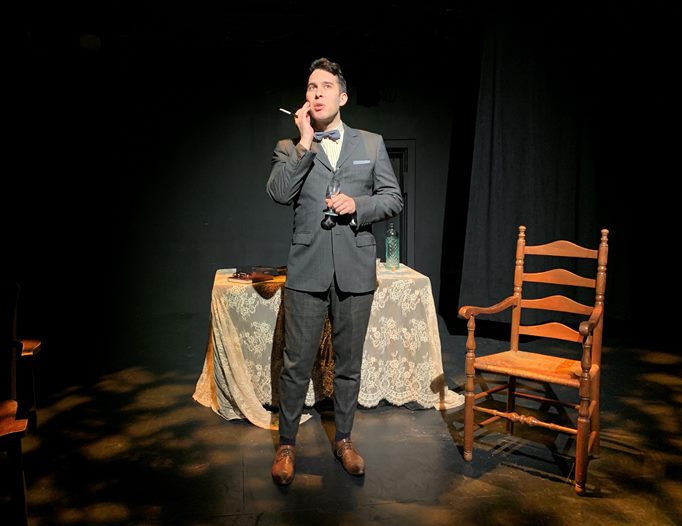Following a long pandemic delay, Tennessee Rising: The Dawn of Tennessee Williams – an earlier version of which won the award for Best One-Man Show in the 2017 United Solo Festival and headlined the 2018 Tennessee Williams Festival in St. Louis – is back on the NYC stage for a limited engagement at AMT Theater, after a short outdoor run on the cell theatre’s patio in the spring of 2021. Written and performed by Jacob Storms and directed by Alan Cumming, the engrossing and informative first-person monologue offers an exhaustively researched in-depth look at the life, thoughts, and aspirations of the eponymous writer, presented in direct address from his own personal perspective, during his six-year formative period from March 1939-March 1945.

Dressed in period-style clothing, with the familiar accessories of a cigarette-holder and dark glasses (costumes by Taylor Negron and Daisy Lopez), and feigning a light southern accent, Storms (who doesn’t resemble or sound like the real-life figure but evokes his persona with his authentic mannerisms and demeanor) enters as the 28-year-old Williams, living on his own for the first time at a boarding house in New Orleans, and carrying a half-empty liquor bottle, which he raises “to the kindness of strangers.” He then takes us through the key points, secrets, and intimate details of his background, relationships, travels, and struggles to launch his legendary career, beginning with the change of his given name Thomas to his nom de plume Tennessee, and his birth year from 1911 to 1914, to submit his plays to NYC’s Group Theatre contest for young playwrights under the age of 25. It worked; he won a special award and was also encouraged to apply for a Fellowship Grant from the Rockefeller Foundation, which he later received, representing another step on his road to success.
The memory play is presented in the format of vignettes that take us from NOLA to a variety of other locales visited by the emerging playwright, from LA, Laguna Beach, St. Louis, Taos, Provincetown, Mexico City, Boston, Key West, Macon, and Chicago, to his first triumph in New York, with the acclaimed Broadway production of The Glass Menagerie, starring Laurette Taylor, who originated the role of Amanda Wingfield, in 1945. In a style inspired by Williams’ descriptive poetic writing, Storms incorporates quotations from his subject’s well-known works, reveals the actual autobiographical sources for his themes and characters (including The Glass Menagerie, A Streetcar Named Desire, The Night of the Iguana, and Cat on a Hot Tin Roof, among others), recounts anecdotes about his lovers and the famous people he encountered along the way, and describes the pain of familial dysfunction he endured from childhood, with the marital discord of his parents, the heavy drinking of his father, the traditional southern values of his doting and sometimes unstable mother, and the mental illness (and eventual lobotomy) of his sister Rose, leading him to the fear and realization that he, too, could just as easily lose his mind, as he battles the “blue devils” of depression and anxiety that haunt him.

He also engages in socio-political diatribes about WWII, Nazi fascism, the attack on Pearl Harbor, the vilification of Asians in the US, and the need to fight against totalitarian authority in our own country as well as in Europe, along with praising and deriding some of the biggest names in the entertainment industry of the time, whom he was beginning to meet and to work with, through the efforts of his agent Audrey Wood and his own growing contacts. While delivering the wealth of recollections and revelations, Storms moves around the small space, furnished with two wooden chairs and a lace-draped table, on which are placed the well-chosen props of a stack of leather-bound books, an old-fashioned manual typewriter, and an assortment of liquor bottles and glasses that succinctly encapsulate Williams’ main interests. The compelling performance is supported by shifts in lighting (by Brent West), vintage music, and apropos sound effects (by Alex Santullo) that change with the moods, locations, and events he shares, in a show filled with fascinating insights into one of the foremost American playwrights of the 20th century.
Running Time: Approximately 70 minutes, without intermission.
Tennessee Rising: The Dawn of Tennessee Williams plays through Sunday, April 2, 2023, at AMT Theater, 354 West 45th Street, NYC. For tickets (priced at $35-45, plus fees), go online. Masks are not required.





